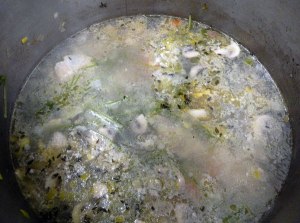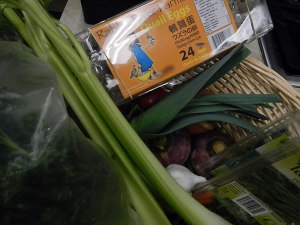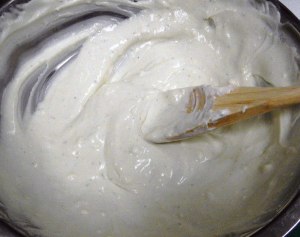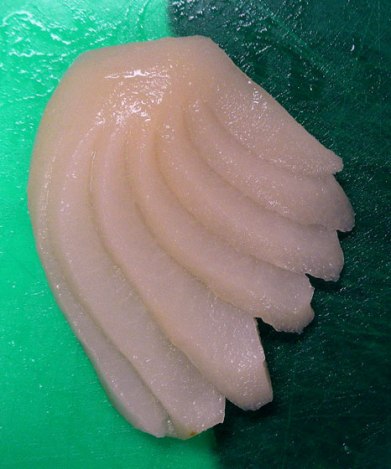Part 1 of our second class in the food and wine of the Rhone Valley started with an ‘Epicurean Fish Consommé’ that was started in our previous class, followed by a ‘Salad with Bleu de Bresse Cheese and Grilled Walnuts’.
Epicurean Fish Consommé – Class 1
The fish stock (also called fish fumet) for this consommé was started in Class 1.
- start with about one and a half pounds of white fish bones, well-rinsed with the eyes and any blood removed
- finely cut up a mix of vegetables – onion, celery, carrot, leek, mushrooms…
- sweat the vegetables in a small amount of olive oil until soft — do not brown
- add the fish bones and sweat for a few minutes more
- add 1/2 cup white wine (optional) and sweat some more
- add a couple of quarts of cold water and the bouquet garni
- bring to a boil, and cook for no more than 30 minutes, skimming off the foam every ten minutes or so
- let stand for ten minutes then strain, cool and refrigerate
Epicurean Fish Consommé – Class 2
In Class 2 the stock was clarified, a long drawn-out process that consisted of lots of continuous stirring as well a foam scooping.
Then there was the quail egg experience! The shell was gently cut open with scissors, and the egg poured into a tea cup. The cup containing the egg was lowered into gently simmering vinegar water and the egg tipped out. A swift (but gentle) movement was required to keep the white from going all over the place. Three minutes later the eggs were perfect – the whites cooked but the yokes still runny. Sounds simple, but a lot of the yokes broke and then had to be eaten by (eager) test cooks.
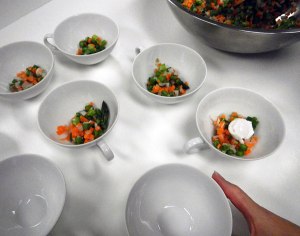
vegetables Brunoise in the bottom of the individual soup bowls – the bowl on the far right already has a quail egg placed and is now ready for the soup stock
Vegetables ‘Brunoise’, consisting in this case of carrot, turnip, asparagus and green beans, were diced, blanched and placed in the bottom of the serving bowls. The trimmed poached quail eggs were placed on top of the vegetables in the waiting soup bowls. At this point the fish ‘fumet’ was added and the consommé was served immediately. Personally I found the soup a little too delicate for my taste. Combine this with the fact that it also took a long time to put it together and needed constant attention, and this is one dish I won’t be trying to make it at home.
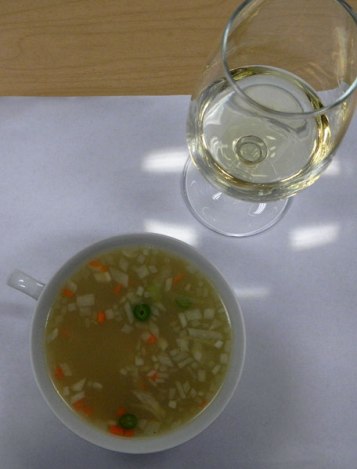
The soup was served with a $60 white wine from the region: Crozes Hermitage. This wine was lemony and acidic, and Chef Eric noted that it would compliment both strong foods as well as rich, buttery dishes — one student suggested a soufflé with a one half camembert, one half blue cheese filling. We had it with both the fish consommé and the following salad.

Salad with Bleu de Bresse Cheese and Grilled Walnuts
If anything stands out for me in the food of this region it is the salads, and this one is a prime example.
The dressing is made from blue cheese from the region combined with sour cream (or crème fraiche), walnut oil, white wine vinegar and pepper, whipped until smooth and creamy. In class I used a wooden spoon and it took FOREVER; I think next time I would use some sort of machine blender…
TIP: the recipe called for ripe pears but the pears we had were hard as rocks. Chef Eric had me peel them, cut them into quarters, core them and then blanch them in simmering water to which 1/3 cup of sugar had been added. We tested them by poking a knife into them to see if they were soft. 10 minutes later they were. Chef Eric demonstrated the fancy way to cut up a quarter pear but unfortunately there were only eight quarters and eleven people so I just chopped the pears up and tossed them into the salad.
The salad consisted of curly endives (greens), toasted walnuts, pear, celery and crumbled blue cheese. To plate the salad we added a leaf or two of Belgian endive, then the tossed salad followed by a small amount of crumbled blue cheese set aside and chopped chives.
This was a super salad and I think one could substitute whatever greens and blue cheese that was available – it wouldn’t be Lyonnaise but it would still be tasty! Unlike the consommé, this dish will be showing up on my table a fair bit…


